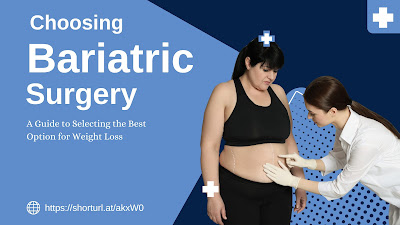Choosing the Right Bariatric Surgery Procedure: A Guide to Selecting the Best Option for Weight Loss
 |
| Choosing the Right Bariatric Surgery Procedure: A Guide to Selecting the Best Option for Weight Loss |
Bariatric surgery is a medical procedure designed to help individuals with severe obesity achieve significant weight loss by altering the digestive system. There are several types of bariatric surgeries available, and the best procedure depends on various factors such as the patient's health, weight loss goals, and medical history. Here are some commonly performed bariatric surgeries:
Gastric Bypass Surgery (Roux-en-Y): This procedure involves creating a small stomach pouch and rerouting the digestive system to bypass a portion of the small intestine. It restricts food intake and reduces the absorption of calories and nutrients. Gastric bypass is considered the gold standard for weight loss surgery and provides substantial long-term weight loss.
Sleeve Gastrectomy: In this surgery, a large portion of the stomach is removed, leaving a smaller, banana-shaped stomach. It reduces the stomach's size and restricts the amount of food that can be consumed. Sleeve gastrectomy has become increasingly popular due to its effectiveness and lower complication rates.
Adjustable Gastric Band: A band is placed around the upper part of the stomach, creating a small pouch. The band can be tightened or loosened to control the amount of food consumed. While adjustable gastric banding is less invasive, it typically results in slower weight loss compared to other procedures.
Biliopancreatic Diversion with Duodenal Switch (BPD/DS): This surgery involves a sleeve gastrectomy combined with rerouting the intestines to reduce calorie absorption. BPD/DS is usually recommended for patients with a BMI over 50 or those with specific metabolic conditions. It can achieve significant weight loss but carries a higher risk of complications.
The choice of procedure depends on factors such as BMI, obesity-related health conditions, lifestyle, and individual preferences. It is essential to consult with a qualified bariatric surgeon who can evaluate your specific situation and recommend the most suitable procedure for you. They will consider your medical history, weight loss goals, and potential risks and benefits associated with each surgery.
Mini Gastric Bypass: This procedure is similar to the traditional gastric bypass but involves creating a longer and narrower stomach pouch. The small intestine is then attached to this new stomach pouch. Mini gastric bypass is less invasive and quicker to perform, but it carries a slightly higher risk of bile reflux.
Duodenal Switch (DS): This surgery combines a sleeve gastrectomy with intestinal rearrangement. A large portion of the stomach is removed, similar to a sleeve gastrectomy, and the small intestine is rerouted to create two separate pathways. The DS procedure offers significant weight loss and is particularly effective for individuals with a higher BMI or those with conditions like diabetes.
Intragastric Balloon: This procedure involves placing a deflated balloon in the stomach, which is then filled with saline solution to create a feeling of fullness. The balloon remains in the stomach for a limited period, usually up to six months, and is then removed. Intragastric balloons are temporary and can be a less invasive option for individuals who do not qualify for or prefer to avoid permanent surgery.
It's important to note that bariatric surgery is a major medical procedure and should be considered after careful evaluation and consultation with a healthcare professional. Each procedure has its own advantages, risks, and potential complications, so it's crucial to weigh the benefits and potential drawbacks based on your individual circumstances.
Additionally, post-surgical lifestyle changes, including a healthy diet, regular exercise, and ongoing medical monitoring, are critical for long-term success after any bariatric surgery. Close follow-up with a multidisciplinary bariatric care team is typically recommended to ensure optimal outcomes and support throughout the weight loss journey.
Always consult with a qualified bariatric surgeon or healthcare provider who can provide personalized advice based on your specific situation.
Source: www.obesitycoverage.com
